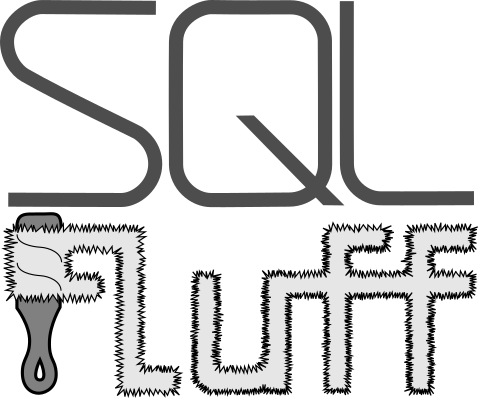📜 The SQL Linter for Humans¶
Bored of not having a good SQL linter that works with whichever dialect you’re working with? Fluff is an extensible and modular linter designed to help you write good SQL and catch errors and bad SQL before it hits your database.
Notable releases:
1.0.x: First stable release, no major changes to take advantage of a point of relative stability.
2.0.x: Recode of rules, whitespace fixing consolidation,
sqlfluff formatand removal of support for dbt versions pre 1.1. Note, that this release brings with it some breaking changes to rule coding and configuration, see Upgrading from 1.x to 2.0.
For more detail on other releases, see our Release Notes.
Want to see where and how people are using SQLFluff in their projects? Head over to SQLFluff in the Wild for inspiration.
Getting Started¶
To get started just install the package, make a sql file and then run SQLFluff and point it at the file. For more details or if you don’t have python or pip already installed see Getting Started.
$ pip install sqlfluff
$ echo " SELECT a + b FROM tbl; " > test.sql
$ sqlfluff lint test.sql --dialect ansi
== [test.sql] FAIL
L: 1 | P: 1 | LT01 | Expected only single space before 'SELECT' keyword.
| Found ' '. [layout.spacing]
L: 1 | P: 1 | LT02 | First line should not be indented.
| [layout.indent]
L: 1 | P: 1 | LT13 | Files must not begin with newlines or whitespace.
| [layout.start_of_file]
L: 1 | P: 11 | LT01 | Expected only single space before binary operator '+'.
| Found ' '. [layout.spacing]
L: 1 | P: 14 | LT01 | Expected only single space before naked identifier.
| Found ' '. [layout.spacing]
L: 1 | P: 27 | LT01 | Unnecessary trailing whitespace at end of file.
| [layout.spacing]
L: 1 | P: 27 | LT12 | Files must end with a single trailing newline.
| [layout.end-of-file]
All Finished 📜 🎉!
Contents¶
Documentation for SQLFluff:
- Getting Started
- SQL in the Wild
- Vision for SQLFluff
- Rolling out SQLFluff with a new team
- Let’s talk about whitespace
- Rules Reference
- Core Rules
- Specific Rules
Rule_AL01Rule_AL02Rule_AL03Rule_AL04Rule_AL05Rule_AL06Rule_AL07Rule_AM01Rule_AM02Rule_AM03Rule_AM04Rule_AM05Rule_AM06Rule_AM07Rule_CP01Rule_CP02Rule_CP03Rule_CP04Rule_CP05Rule_CV01Rule_CV02Rule_CV03Rule_CV04Rule_CV05Rule_CV06Rule_CV07Rule_CV08Rule_CV09Rule_CV10Rule_CV11Rule_JJ01Rule_LT01Rule_LT02Rule_LT03Rule_LT04Rule_LT05Rule_LT06Rule_LT07Rule_LT08Rule_LT09Rule_LT10Rule_LT11Rule_LT12Rule_LT13Rule_RF01Rule_RF02Rule_RF03Rule_RF04Rule_RF05Rule_RF06Rule_ST01Rule_ST02Rule_ST03Rule_ST04Rule_ST05Rule_ST06Rule_ST07Rule_ST08Rule_TQ01
- Inline Ignoring Errors
- Dialects Reference
- Production Usage
- Configuration
- CLI Reference
- API Reference
- Release Notes
- Internals
- Developing Rules
- Developing Plugins
- SQLFluff in the Wild
- SQLFluff Slack
- SQLFluff on Twitter

